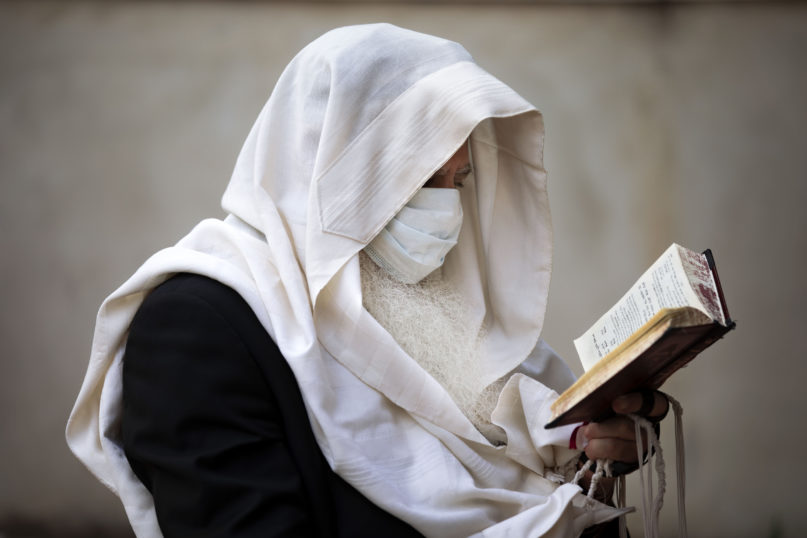Forget the Emmys, Tonys, and Grammys.
This year’s new award is the Shuly – my brother Arne’s invented word — in honor of synagogues and how they will be presenting High Holy Day services during the COVID crisis. In many cases, synagogues with significant resources were able to get really creative with their worship offerings.
We have been fortunate in being able to get some advance predictions on these awards.
Best appearance by a Jewish celebrity. The synagogue in Las Vegas that hired the comedian Gilbert Gottfried to read the Yizkor service. In that voice.
Best appearance by a non-Jewish celebrity who everyone thinks is Jewish: This was a tie.
One synagogue in Los Angeles engaged Rachel Brosnahan preaching about the binding of Isaac in full character as Midge Maisel:
“Where the ______ was that kid’s mother in all this? Let me see if I got this straight. She’s Jewish; the kid’s Jewish – and she lets him go into the desert for three days. What is that – like, camping? No. No, no, no. I don’t care what the Torah says – these people were not Jewish. A Jewish father taking his kid into the desert? Without a Whole Foods anywhere for, what, a hundred miles? Give me a break.”
Not to be outdone, a synagogue in Beverly Hills hired Kathryn Hahn to do the overflow Zoom service in her role as Rabbi Raquel Fein on Transparent.
No one guessed that Ms. Hahn is not Jewish.
In fact, the board was so impressed that they met in emergency session during the Yom Kippur martyrology (Said the treasurer: “Let’s see. I have a choice between a board meeting and listening again to how Rabbi Akiba died slowly. I will take the board meeting.”) and unanimously decided to offer her a contract as an associate rabbi.
Kathryn’s reaction: “Wait. Tell me about that parsonage thing again. I get to do what?”
Best posthumous appearance by a Jewish actor during a prime time worship service. A synagogue in Portland channeled the late Kirk Douglas and brought him back for a few moments. (It was a men’s club project). Kirk did an admirable job of telling kids to stay in religious school and continue their Jewish education before he faded back into the olam ha-ba.
Best original score for a High Holy Day service. No contest. A synagogue in New York managed to hire Lin-Manuel Miranda to do a hip hop version of the entire Yom Kippur service.
They got Jonathan Groff to play God, singing:
“You’ll be back, wait and see,
I can’t wait ‘til you return to Me.
You have sinned, that’s OK,
I will wait until your dying day
Empires rise, empires fall,
We have seen each other through it all,
And when push comes to shove,
I will send pestilence and plagues and pogroms and all that Unetaneh Tokef stuff
To remind you of My love.”
Best use of politics in a worship service. A cantor in Nebraska came up with the idea that rather than have an election, Biden and Trump would blow the tekiah gedolah at the end of Yom Kippur – with the winner of the election being the candidate who offered the longest blast.
Mayhem ensued when, forty minutes into his blast (and everyone nervously looking at their watches, because they were overdue for the Zoom break the fast at their mother’s house, which they could not have entered anyway), President Trump collapsed.
For a split second, Vice President Pence took over the blowing – and perhaps even the presidency — with people screaming that he had not properly sanitized the shofar.
Whereupon, Joe Biden kept blowing, until Trump, reviving, claimed that there would be mail in blasts in subsequent days, and that “the whole ram’s horn blowing thing” (his words) was rigged from the beginning.
Most creative uses of current language fads in a worship service. The prize goes to the rabbi in Wisconsin who included the following over the course of the holy days: “For those of you who are privileged in body, please rise….We call upon the president of our youth group, who is lung-privileged, to blow the shofar….For those who are sin-privileged, please rise.”
The rabbi also invented new euphemisms for various items:
- “Semitically-challenged” for gentiles.
- “Temporarily food challenged” for those who fast.
- “God deprived” for atheists.
Most creative editing of services for the sake of avoiding Zoom fatigue. The rabbi in Ohio who totally ditched the machzor. She got up on erev Rosh Ha Shanah and said: “It’s been a really crappy year. Am I right, or am I right? Next year will be better. Probably. We rise for Aleinu.”
On Kol Nidre, she said: “God, You know how last year we said that we would do stuff and we didn’t? Well, that’s gonna happen again next year. Deal with it. We rise for Aleinu.”
Yom Kippur morning: “My bad. Actually, our bad. We rise for Aleinu.”
Yizkor: “They were wonderful people. We miss them. We rise for El Malei Rachamim and Kaddish.”
Best zoom faux pas. We did not want to get into this, but an organist in a synagogue in Pennsylvania had to answer the call to nature, and forgot to mute himself. Or, to turn off the camera.
It has been a very difficult six months.
Shanah tova u’metukah — a good, sweet, redemptive year to everyone.
May the gods of Zoom and Facebook look graciously upon us.






